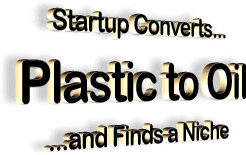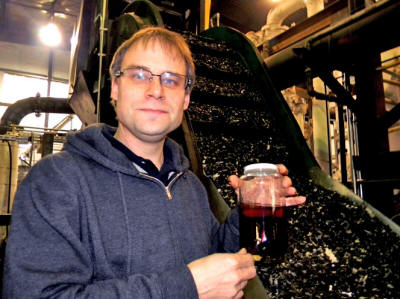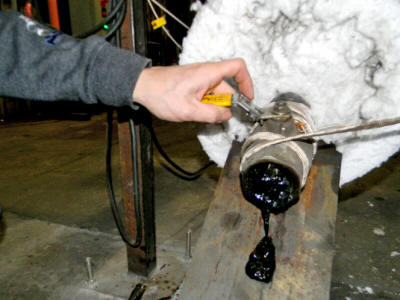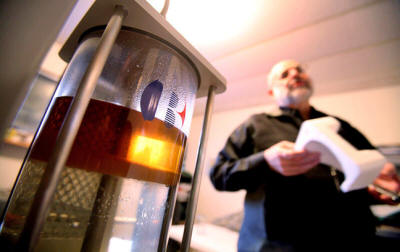|

by Daniel Robison
March 19, 2012
from
NPR Website

JBI CEO John
Bordynuik holds a jar of No. 6 fuel oil,
derived from
discarded plastic like that seen on a conveyor belt at his plant.
Only 7 percent of plastic waste in the
United States is recycled each year, according to the Environmental
Protection Agency. A startup company in Niagara Falls says it can
increase that amount and reduce the country's dependence on foreign
oil at the same time.
It all starts with a machine known as the Plastic-Eating Monster.
Thousands of pounds of shredded milk jugs, water bottles and grocery
bags tumble into a large tank, where they're melted together and
vaporized.
This waste comes from landfills and
dumps from all over the United States.
"Basically, they've been mining
their piles for us and sending them here," says John
Bordynuik, who heads his namesake company,
JBI Inc.
He invented a process that converts
plastic into oil by rearranging its hydrocarbon chains.
Vying For
Mainstream Acceptance
According to tests by the New York Department of Environmental
Conservation, JBI's patented technology is efficient, with close to
90 percent of plastics coming out as fuel.
Bordynuik says that makes the case for
this kind of recycling to go mainstream.
"When there have been attempts in
the past to make fuel from plastic, it's been low-quality,
low-flashpoint, kind of sludgy," he says. "In this case here,
we're making a very highly refined, consistent product that's
within specifications of any standardized fuel."
JBI executive Bob Molodynia points to a
spout at the other end of the plastic-eating machine, where a thin,
brown liquid drips out.
"You could tap this right now and
this is ready to go," he says.
"That's a No. 6 fuel. That's what a
lot of [companies] like U.S. Steel use, a lot of major companies
- that's what they pay the big bucks for, right there."

After being delivered
to JBI's Plastic2Oil facility,
shredded plastic is
melted down in a large tank before being vaporized and formed into
fuel.
John Bordynuik
releases some of the substance to check for quality.
After being delivered to JBI's Plastic2Oil facility, shredded
plastic is melted down in a large tank before being vaporized and
formed into fuel. John Bordynuik releases some of the substance to
check for quality.
Each barrel of oil costs about $10 to produce. JBI can sell it for
around $100 through a national distributor. The young company is
already producing a few thousand gallons of oil a day. It has signed
lucrative deals to set up operations next to companies with large
volumes of plastic waste.
But in its rush to grow, JBI has been accused by the Securities
and Exchange Commission of overvaluing some of its assets in
order to raise more funds.
The Stigma Of
An 'Alternative Fuel' Label
And Bordynuik says it has been hard to find acceptance from
potential oil buyers because JBI's product has been dubbed a "green
fuel."
"We don't make a synthetic 'other'
product that has problems," he says. "We make an in-spec fuel
like everyone else. If anything, the word 'alternative' has a
stigma attached to it, more so because of prior attempts."
If JBI has its way, plastics will become
a significant source of domestic fuel that reduces the U.S.
dependence on foreign oil.
But just how "green" is JBI's recycling,
when it produces a fossil fuel that pollutes just like any other?
"To enter themselves into this
industry, I think that they've all bought into the idea of
producing a fuel," says Carson Maxted of Resource Recycling, the
plastic recycling industry's trade journal.
Maxted says he's not sure whether
converting plastic to oil can be considered recycling, or even
environmentally friendly.
But he says JBI's methods can co-exist,
and even complement, current recycling practices.
"They're getting value from
something that would otherwise go to the landfill," he says,
"because the plastics most of them are looking for, the plastics
that are not easily recycled, they're of low quality or
mixed-plastic types, or they're dirty - things that wouldn't be
accepted into a recycler."
And because there's no lack of
waste-plastic supply, and no lack of demand for oil, Maxted says the
technology has the potential to transform both industries.
Machine That Converts Plastic to Oil
...Fuels
Bernie Karl's Big Dreams
by
Jeff Richardson
January 31, 2011
from
NewsMiner Website

Bernie Karl, owner of K&K Recycling and
Chena Hot Springs Resort, demonstrates his
latest endeavor, a new plastic-to-fuel oil
processing machine Friday morning, January
27, 2011. The table-top unit, manufactured
by the Japanese company Blest, uses a
gasification process similar to an alcohol
still to melt down plastic and convert it
into a fuel which Karl says is comparable to
diesel fuel. Here the finished fuel is seen
separated from the water in the collection
tank.
Eric Engman/News-Miner
FAIRBANKS
It sounds like a science-fiction
solution to many of the world’s energy problems - a device that can
convert plastic back into liquid fuel.
Local businessman Bernie Karl thinks the concept might not be
that far-fetched. The owner of
K&K Recycling and
Chena Hot Springs Resort spent Friday morning watching it happen in a back room of his
Richardson Highway office.
While insisting his newly purchased Blest plastic-to-oil machine is
“no silver bullet,” Karl believes it could play a significant role
keeping plastic out of landfills while contributing relatively
inexpensive fuel to Alaskans.
It’s been fired up at his Richardson Highway businesses about a
dozen times, making roughly a gallon of fuel out of more than
10 pounds of plastic.
In the early stages, Karl said, it’s
everything he’d hoped it would be.
“It might not work for everyone, but
it sure would be good for a community,” Karl said.
Karl gained a reputation for innovative
energy ideas by converting Chena Hot Springs Resort into a business
fueled almost entirely by geothermal power.
At K&K Recycling, he began a large-scale
recycling program last October. It collects paper, glass and metal
from the University of Alaska Fairbanks, local schools and Fort
Wainwright.
For months, Karl has stockpiled discarded plastic at the business on
the Richardson Highway near North Pole. Plenty of people have
wondered why, since there was no obvious use for it in Interior
Alaska.
The Blest machine, he said, is the answer.
Karl said he’s the first person in North
America to purchase the device.
“I really took a lot of criticism
for collecting plastic,” Karl said. “I may have the last laugh.”
The Japanese machine, which costs
$16,000 and can fit on a desktop, works much like a still.
Various plastics, from Styrofoam to
empty bottles, are placed into a vat that is electrically heated to
800 degrees, turning most of the plastic into a gas. The gas is
routed through a nearby container of water, which instantly cools it
and turns it into fuel.
The end product has a golden color and carries the biting scent of
burning plastic. Karl described it as “diesel-like.” He plans to
test whether it can replace standard fuel in a space heater.
A Blest video about the device claims its product can easily be
refined into gasoline, diesel or kerosene. A UAF petroleum
engineering professor couldn’t be reached to discuss the viability
of such a device.
Karl said there are plenty of skeptics about the process, and he
admits he’s still waiting to see if it does everything its makers
claim.
A filter is supposed to remove harmful
emissions from the process, and he plans to have the air quality
tested before boosting production.
“I believe in it,” Karl said. “I
just want to make sure everything does what (they) say it does.”
Karl said he’s always been intrigued
about the potential of recycling plastic, which is made from
petroleum but typically ends up piled in a landfill at the end of
its life.
So when he saw an online presentation from Blest, which designed the
machine, he placed an order within 20 minutes. The video for the
plastic-to-oil machine was posted on YouTube last summer and caused
a stir on the Internet as a potential savior to the world’s energy
crisis:
Karl said it takes a kilogram of plastic to create about a liter of
fuel. So far, a batch has used 3 kilowatts of electricity or less,
which he said translates into less than $2 per gallon for refined
fuel at local electric rates.
With the added benefit of producing residual heat that could warm a
building, he said the process appears to make good economic sense.
“If it in fact does what it says, it
all pencils out well,” Karl said.
Karl said he’s seen other devices that
claim to transmute plastic to fuel. None operates as cheaply as the
Blest machine, he said.
If the smaller Blest device performs as Karl expects, the next step
it to buy a larger $250,000 version that could produce as much as
2,400 gallons of fuel per day. He said the larger device can fit in
the back of a pickup and would be more efficient.
He said the machine would be even more valuable in rural Alaska,
where gas can cost $10 per gallon or more. The machine could be
powered with wind turbines, he said. Under the right circumstances,
he said, it could transform village life.
Before that, he hopes to create enough fuel to run his company’s
fleet of vehicles.
The inventor of the process, Akinori
Ito, will visit in March to help K&K take the next step, Karl
said.
“We’re just trying to learn what we
can learn,” he said.
|



